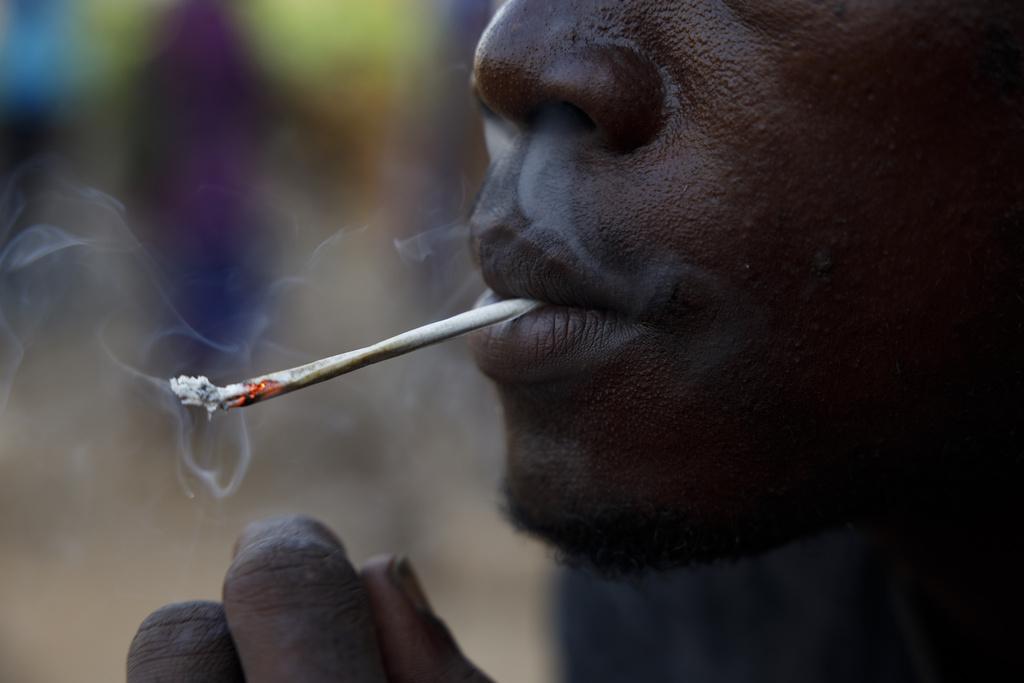ADF STAFF
Ernest Fornah, 32, is among Sierra Leone’s growing number of kush addicts. He smokes the drug four times a day and often can be found sitting with other users on streets and alleyways in Freetown, the capital.
“These drugs are killing us,” he told the Financial Times newspaper.
The unemployed university graduate and father of one is emblematic of his country’s drug crisis. Kush is cheap and plentiful, but for Fornah the high is alluring and the withdrawal symptoms are painful.
According to a Sierra Leone government-backed analysis, kush is a synthetic drug containing nitazenes, synthetic opioids that can be up to 100 times more potent than heroin and up to 10 times more potent than fentanyl. Users can get high from a tiny amount, putting them at increased risk of overdose and death.
This year, traces of nitazenes have begun appearing in drugs consumed by Africans, marking a dangerous turning point on a continent that previously was known more as a transit point for drugs.
“Our country is currently faced with an existential threat due to the ravaging impact of drugs and substance abuse, particularly the devastating synthetic drug kush,” Sierra Leonean President Julius Maada Bio said during a televised address in April in which he declared a national emergency.
“The deterioration and alarming mortality of our young people due to the addictive use of kush is no longer acceptable.”
Kush has been in Sierra Leone for several years and reportedly is taking hold in neighboring Guinea, Guinea-Bissau and Liberia. Sierra Leones government blames kush for hundreds of deaths and said that between 2020 and 2023 psychiatric admissions linked to kush surged by almost 4,000%.
The United Nations recently raised alarm over several drug concoctions that pose health risks across Africa because of their varying and often unknown ingredients.
Dangerous mixtures of pharmaceuticals, alcohol and solvents have been found in these new drugs, the U.N. Office on Drugs and Crime (UNODC) said in its annual World Drug Report, published on June 26.
The report stated that Africa remains a key transit point for cocaine in the west, heroin in the east, and cannabis resin in the north. While the continent accounts for half of the global quantities of pharmaceutical opioids seized between 2017-2021, the UNODC said that these opioids are primarily consumed in the region.
“Africa has long been considered simply as a transit area, which contributes to the invisibility of drug users and the emergence of local markets,” Dr. Amado Philip de Andrés, UNODC Regional Representative for West and Central Africa, said in a statement. “States in the region must continue to invest in data production, particularly on consumption, for better care.”
- Côte d’Ivoire: The use of Khadafi, a mixture of tramadol and energizing alcoholic beverages, became so widespread in 2023 that the government banned the import and export of such beverages.
- Nigeria: A popular drink called Monkey Tail is a mix of homemade gin and cannabis seeds, leaves, stems and roots. Tramadol abuse also is common in Nigeria and in parts of North Africa. More than 90% of global tramadol seizures occurred in Africa in the past five years.
- South Africa: Nyaope is a mix of low-grade heroin cut with marijuana, cleaning chemicals, rat poison and other harmful substances. It has become popular in many townships.
- Malawi: A dangerous home-brewed cocktail — known locally as “God take me” — has become prevalent.
“The local drug markets in Africa are rapidly diversifying, shifting from a predominance of domestically sourced cannabis to a multitude of transiting drugs,” the UNODC said. “This diversification is exacerbating existing health challenges, particularly as the availability of drug treatment services are limited in West Africa.”
Ansu Konneh, director of mental health at Sierra Leone’s Ministry of Social Welfare, leads the country’s first public drug rehabilitation center, which opened in Freetown in February. He said kush has ravaged Sierra Leone like nothing he has ever seen.
“It’s making young people drop out of college, and it’s having a physical effect on their health. You can see they have swollen feet, they have multiple organ failures, they’re involved in crimes,” he told The Associated Press. “It’s a very serious situation. It’s creating family disintegration, problems in communities, and they’re dying every day.”
Austin Demby, Sierra Leone’s health minister, told Financial Times that a noticeable increase of “unclaimed dead bodies [of drug users] showing up in marketplaces and hospital morgues made us realize there was something going on that we needed to pay close attention to.”
Demby, who worked on the response to West Africa’s 2014 Ebola outbreak, said the new drug crisis calls for the application of lessons learned from previous health emergencies, such as the COVID-19 pandemic.
“If you have all of government and society engaged in [finding] the solution … you could manage even the worst situations,” he said. “With kush, all we needed was the rallying cry.”

